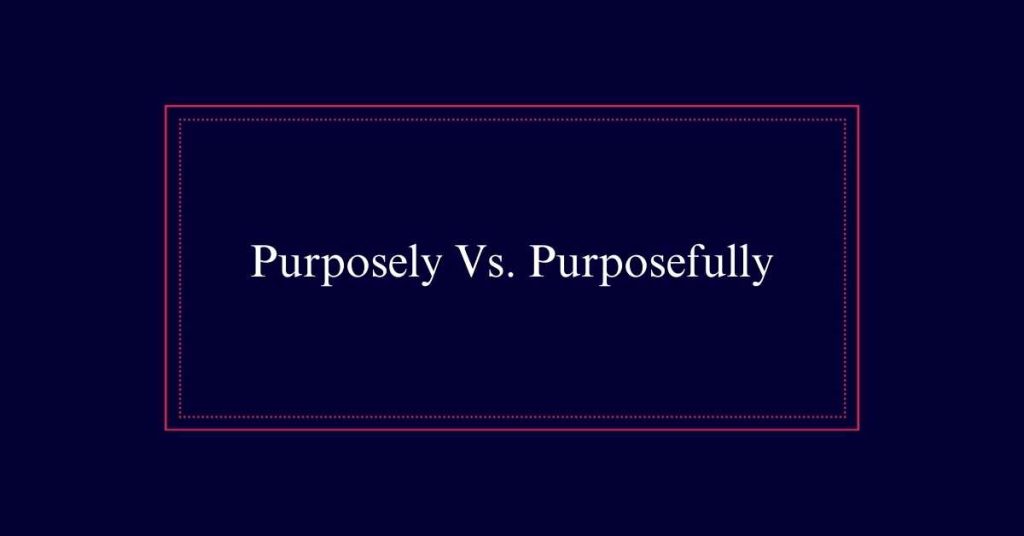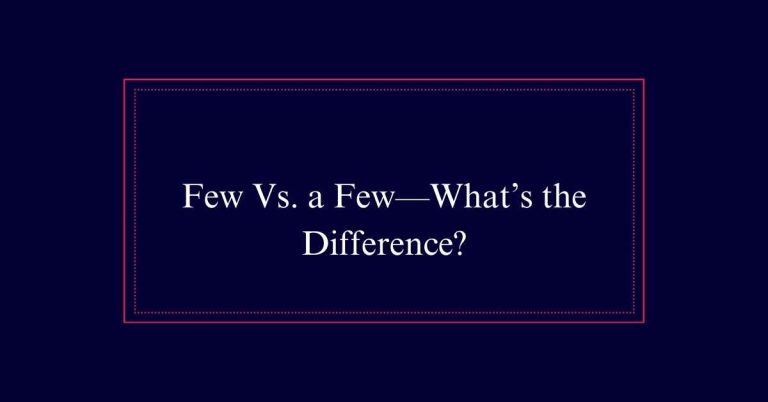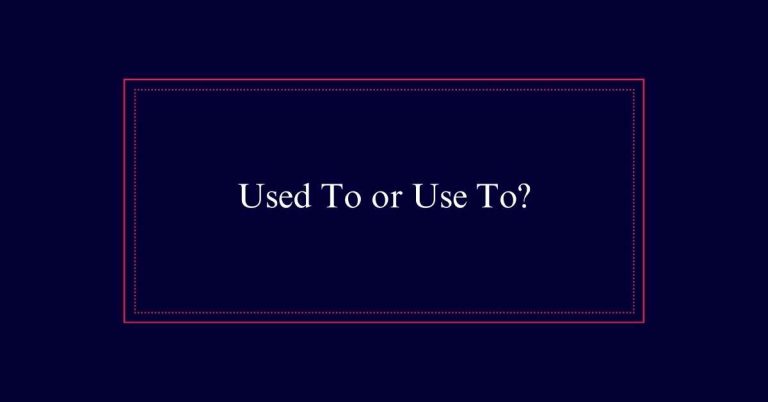Purposely Vs. Purposefully
The terms ‘purposely’ and ‘purposefully’ often confuse writers, but they have distinct meanings. ‘Purposely’ means doing something with clear intention or deliberateness. For example, “She purposely left the note on the table.” It highlights the intent behind an action. On the other hand, ‘purposefully’ describes performing an action with determination and focus. For instance, “He purposefully selected times for maximum attendance.”
Definitions of Purposely
Purposely means performing an action deliberately or with intention. When something is done purposely, it is done with a specific goal or reason in mind. This word highlights the intentional nature of the action, differentiating it from actions that happen by accident.
For example, if someone purposely leaves a door open, they have a clear intention behind that choice. The opposite of purposely is accidentally, where actions occur without premeditation.
Definitions of Purposefully
Purposefully describes actions carried out with determination and a clear sense of purpose. It signifies that an individual is not just acting intentionally but with a specific goal in mind. When a person acts purposefully, they exhibit clear intent and resolve to achieve their objective.
This term is often used to highlight the conscientious effort behind an action. For example, a supervisor might purposefully organize files to improve efficiency. Unlike ‘purposely,’ which simply means on purpose, ‘purposefully’ emphasizes the methodical and deliberate nature of the action.
Opposites of Each Term
The opposites of purposely and purposefully are essential for understanding their precise meanings and proper usage.
Purposely means intentionally, so its opposite is accidentally. When someone does something purposely, they do it on purpose. Conversely, if they do something accidentally, it happens without intent.
Purposefully means performing an action with determination. Its opposite is negligently or carelessly. When someone acts purposefully, they do so with resolve and clear intention. Acting negligently or carelessly suggests a lack of concern or effort.
Example of Purposely
To illustrate the concept of purposely, consider a scenario where a student deliberately leaves their homework at home to avoid presenting it. This action is intentional and done with a specific aim. The student did not forget accidentally; they planned it to escape an unpleasant task.
Here’s a comparison to clarify:
| Term | Example |
|---|---|
| Purposely | Student leaves homework at home |
| Intent | To avoid presenting it |
| Purposely | Theresa places a note on the table |
| Intent | To make sure someone reads it |
Example of Purposefully
Mary arranged the meeting schedule with clear determination to guarantee everyone’s availability. She checked each team member’s calendar and purposefully selected times that would secure maximum attendance. Her approach was methodical and showed her strong resolve to make the meeting productive.

Mary’s actions were not just intentional but also driven by a clear goal. This is an example of acting purposefully. She didn’t leave anything to chance. Instead, she meticulously planned every detail, demonstrating her commitment to success. In this context, ‘purposefully’ underscores the deliberate and determined nature of her planning.
Mary’s focused effort exemplifies how to use ‘purposefully’ to describe actions carried out with clear intent and determination.
Similarities Between Terms
Despite their nuanced differences, purposely and purposefully both convey intentional actions. Both words imply that an action is performed with intent rather than by accident. This shared characteristic makes them similar in meaning, especially in contexts where the emphasis is on the deliberate nature of an action.
For instance, using purposely suggests that something was done on purpose, indicating a clear intention behind the action. Meanwhile, using purposefully indicates that the action was carried out with determination and a specific goal in mind.
In both cases, the underlying theme is intentionality. Understanding this common ground helps writers choose the appropriate term based on the specific context and the subtle emphasis they wish to convey.
Fine Distinctions
The fine distinctions between purposely and purposefully lie in the nuances of intention and determination. When something is done purposely, it means the action was intentional, often with a specific outcome in mind.
For instance, a person might purposely ignore a call to avoid a conversation. Purposefully, however, emphasizes the manner of doing something with resolve and focus. It conveys a sense of deliberate effort and planning.
For example, a project manager might purposefully organize tasks to guarantee efficiency. While both terms imply intentional actions, purposely highlights the intent behind the action, whereas purposefully underscores the determined and methodical execution.
Contextual Usage
Understanding the contextual usage of purposely and purposefully can greatly enhance the clarity of your writing.
Use purposely when you want to indicate that an action is done intentionally but might appear accidental. For example, ‘She purposely spilled her drink to get attention.’ This shows intent without overt determination.
On the other hand, use purposefully when the action exhibits determination and resolve. For instance, ‘He purposefully arranged the chairs for the meeting.’ This suggests a deliberate and thoughtful approach.
Both words imply intentional human involvement. However, choosing the right one depends on the nuance you wish to convey—whether it is mere intention or a sense of determined effort.
Writing Tips
Selecting the appropriate word between purposely and purposefully can refine your writing for greater clarity and impact. To achieve this, consider the specific nuance each word conveys.
‘Purposely’ is best used for actions that are intentional, but may seem accidental. For example, ‘She purposely left the door ajar.’
In contrast, ‘purposefully’ suggests a sense of determination or resolve. For instance, ‘He purposefully addressed each concern.’
Always match the word to the context and intent of the action. This guarantees your message is precise and effective.
Choosing the Right Word
Choosing the right word between purposely and purposefully can greatly impact the clarity of your writing. Purposely means doing something intentionally or on purpose. Use it when you want to stress that an action was done with intent, but might appear accidental. For example, ‘She purposely ignored the phone call.’
On the other hand, purposefully means doing something with determination or resolve. It suggests a focused and deliberate approach. For instance, ‘He purposefully arranged the meeting to address the issue.’







